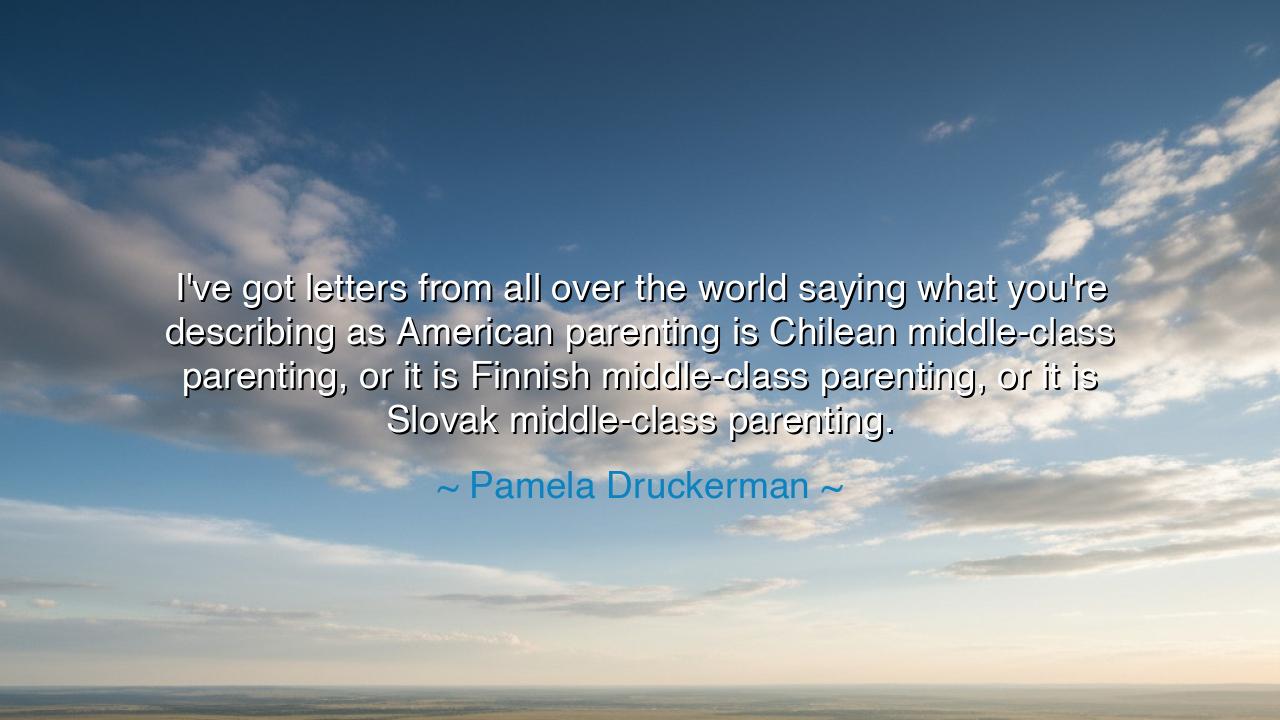
I've got letters from all over the world saying what you're
I've got letters from all over the world saying what you're describing as American parenting is Chilean middle-class parenting, or it is Finnish middle-class parenting, or it is Slovak middle-class parenting.






The words of Pamela Druckerman—“I’ve got letters from all over the world saying what you’re describing as American parenting is Chilean middle-class parenting, or it is Finnish middle-class parenting, or it is Slovak middle-class parenting.”—unveil a profound truth about the human family. They remind us that though oceans divide nations and languages differ upon the tongue, the struggles and patterns of raising children often flow from the same source: the daily realities of class, culture, and circumstance. What appears to be unique to one land is often mirrored in another, hidden beneath the same veil of parental worry, discipline, and love.
The ancients, too, recognized that while customs varied across the earth, the essence of human life was shared. Aristotle wrote of the polis as the foundation of society, yet he knew that the bond of family was universal, stretching beyond the borders of Greece. What Druckerman observes is a continuation of this wisdom: that what some call American parenting may not belong to America alone, but to a broader human condition that transcends borders. It is not a national trait, but the reflection of a shared way of living among families of similar standing across distant lands.
Consider the story of the Roman Empire, which stretched from Britain to Syria, from Egypt to Gaul. Within its vast borders, parents in distant provinces—though separated by culture—often raised their children with similar rhythms: chores for discipline, respect for elders, the hope of securing better lives for their sons and daughters. The Roman mother in Hispania was not so different from the Roman mother in Judea. What united them was not their province but their shared middle-class struggle: to maintain dignity, order, and opportunity amidst the demands of their society.
Druckerman’s insight also reminds us of humility. Too often, nations believe their way of raising children is singular, superior, or exceptional. Yet when parents in Chile, Finland, and Slovakia write to say, “This is our way too,” we are reminded that parenting is both deeply personal and profoundly universal. The particulars may change—the lullabies sung, the foods served, the holidays honored—but the deeper patterns of care, discipline, and aspiration bind humanity together like an invisible thread.
Her words carry within them a lesson against pride and isolation. No people, however powerful, can claim ownership of parenting wisdom. The task of raising children is shared across the globe, and every culture offers mirrors to the others. The American may recognize herself in the Chilean, the Slovak in the Finn. In seeing these reflections, parents can grow wiser, for they realize that what feels unique is part of a larger human story. The struggles are not theirs alone, nor are the victories.
The lesson is this: seek kinship, not separation. Parents should not imagine themselves as solitary guardians, cut off by national borders, but as participants in a timeless fellowship of mothers and fathers across the earth. To compare and to learn is not weakness but strength, for wisdom multiplies when shared. Just as merchants of old carried silk, spices, and gold along the great trade routes, so too should modern parents exchange their stories, their struggles, and their methods of raising children.
Therefore, let your actions be these: listen to the voices of other lands. Read the stories of how children are raised in households unlike your own. Observe the similarities, and embrace the differences as gifts. Teach your children not only the customs of your nation but also the ways others live, so they may grow with humility and empathy. And above all, remember that when you carry your child through sleepless nights, there are countless parents across the world carrying theirs as well, under different skies but with the same trembling love.
Thus, Pamela Druckerman’s words become a hymn of unity: parenting is not the property of one people, but the shared endeavor of humanity itself. Though the accents change and the houses differ, the laughter of children, the discipline of parents, and the longing for a better future bind us as one family. Let this truth be passed to future generations: we are not alone, for in every land, parents walk the same ancient path of love, struggle, and hope.






AAdministratorAdministrator
Welcome, honored guests. Please leave a comment, we will respond soon